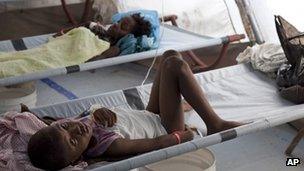UN launches appeal to fight Haiti cholera epidemic
- Published

Two years after the outbreak began, Haitians are still being infected by the disease
The United Nations is launching a $2bn (£1.3bn) appeal to fight a cholera epidemic in Haiti that has killed almost 8,000 people.
It is currently the worst outbreak in the world and there is growing evidence the disease was introduced to the country by UN peacekeepers.
UN officials have refused to answer allegations about the outbreak.
But one of the UN's own cholera experts told the BBC it was "most likely" the epidemic started at a UN base.
The base, which housed peacekeepers from Nepal - where cholera is endemic - had leaking sewage pipes which contaminated a river system.
Lawyers for thousands of Haitian cholera victims have demanded billions of pounds in compensation and have threatened to take the case to court.
The UN wants funds for emergency cholera treatment and for clean water supply systems and sewage plants.
But the lawyers acting for Haiti's cholera victims say they don't want charity - they want justice.
Prior to this outbreak, and despite Haiti's many other problems - including a devastating earthquake in January 2010 - the country had not recorded a single case of cholera for more than a century.
Cholera is a disease of poverty, analysts say. It is spread through infected faeces and, once it enters the water supply, it is difficult to stop - especially in a country like Haiti which has almost no effective sewage disposal systems.
Dr Danielle Lantagne, a top cholera expert in the US, was employed by the UN as one of a so-called Panel of Experts tasked with looking into the outbreak,
After studying molecular data known as full genome sequencing on the strain of cholera found in Haiti - and that prevalent in Nepal in 2010 - she said: "We now know that the strain of cholera in Haiti is an exact match for the strain of cholera in Nepal."
- Published22 October 2012
- Published12 November 2010
- Published10 November 2010
- Published23 October 2010